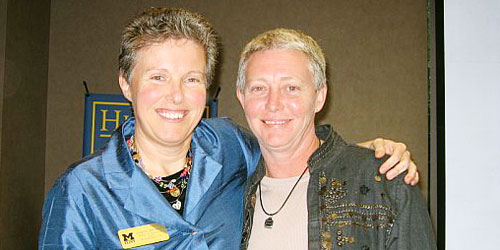
In 1971, the University of Michigan became the first public university to recognize the gay community with an official office to deal with the issues of gays and lesbians on campus. Now, 40 years later, the Spectrum Center is celebrating how far the community has come.
"Spectrum has increased its ally involvement, gotten involved regionally and nationally in the work of LGBT issues on college campuses, and begun to engage its alum base with the office," said Jackie Simpson, the director of Spectrum since 2005. Spectrum has also expanded the scope of its work over the years to include sexual orientations and gender expressions of all kinds, looking at how those demographics co-exist with other labels such as race or religion. Now, Spectrum serves a whole "spectrum" of individuals.
"Students today are interested in learning about how all of their identities interact with each other. In essence, what does it mean to be gay and Christian, or to be a Latina lesbian? Single boxes and single labels are limiting to youth today. I believe this is why more and more youth identify as 'queer' than ever before … It gives them more options," Simpson said.
Spectrum gives students resources for feeling safe to express themselves. It also works with faculty, staff, and other schools to share information and encourage more inclusive campuses. It has a Speakers' Bureau program and an Ally Training program. Plus, the center hosts many other educational and fun events. Spectrum's ruby anniversary year kicked off with a Doin' it for 40 Years bash on Jan. 10 at the U-M Museum of Art, which featured musicians, student artwork, catering and a birthday cake. The center will also host talks with people in the film industry this year, such as Rod Gailes, who directed and produced the movie "Camouflage."
From Feb. 22-24 U-M will host the Midwest Bisexual Gay Transgender Ally College Conference, which is the largest LGBT student-organized conference in the nation. The event attracts more than 1500 students. In March there will be a professional drag show, and in November a pink carpet event for the alumni.
It will be the kind of year that the founders of the office would have only dreamed about back in 1970 when they were denied meeting space to organize a gay conference on campus.
In March 1970 the Detroit Gay Liberation Movement inspired the gay community in Ann Arbor to start a Gay Liberation Front Chapter at U-M. According to Spectrum's website, the goals of the GLF were to "battle stereotypes of gay people, fighting homophobic prejudice, and invalidating the mental illness model of homosexuality." The GLF, along with a sister group called the Radical Lesbians, became officially recognized by the Student Government Council as legitimate student organizations.
The GLF was then denied space for a conference, and in the uproar that followed, school officials decided that a Human Sexuality Office needed to be established. It was the first of its kind in the nation.
Jim Toy of GLF and Cindy Gair of Radical Lesbians were hired at quarter-time pay to be the first employees of the office. Each was titled Human Sexuality Advocate.
One of Toy and Gair's first fights was to have "sexual orientation" included as a protected class in the University's bylaws, to protect gay individuals from discrimination in employment, educational programs and activities and admissions. Toy carried the torch of that campaign for 21 years, until finally in 1993 the Board of Regents voted 8-1 to amend the University bylaws to protect sexual orientation.
Other successes were easier to achieve. In 1973 Toy and Gair formed their first Speakers' Bureau. In the 1980s they were allowed to say "Gay" and "Lesbian" in their title, and thus became The U-M Lesbian Gay Male Programs Office, while also expanding their focus to include bisexuals and people of color. In 1994 they added "Bisexual" to their name. In 1995 they added "Transgender," and now the four offices fall into categories of the Spectrum Center – a place where everyone is welcome.
In a press release, Michigan Student Assembly President Chris Armstrong said he plans to take part in the Spectrum celebrations this year. "The Spectrum Center is truly a place where out LGBT leaders can grow and develop. It connects students to the many resources that are around them and shows them the larger Michigan community they are a part of. If I had not found Spectrum my first week on campus, I would not have succeeded on campus the way I did."
For more information about the Doin' it for 40 Years celebrations or other Spectrum Center services and events, visit http://www.spectrumcenter.umich.edu.










